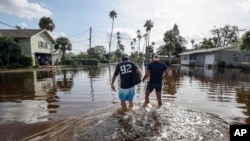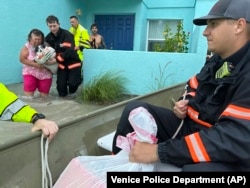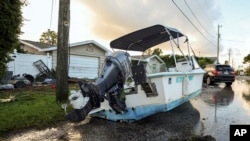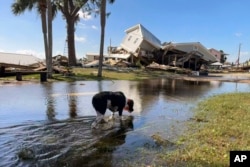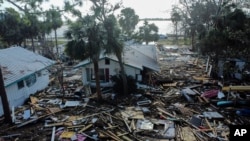Hurricane Helene made landfall late Thursday in Florida's Big Bend region as a Category 4 hurricane. Its damaging effects were felt not only in Florida, but also hundreds of miles away in Georgia, North Carolina and Tennessee. At least 40 people have been reported dead in Helene's aftermath.
Helene is "still producing historic and catastrophic flooding over portions of the southeast and southern Appalachians," the National Hurricane Center (NHC) said in its latest advisory on Friday.
"I beg you, do not go out," Kevin Guthrie, Florida's emergency management director, said Friday. "We have 1,500 search and rescue personnel in the impacted areas. Please get out of the way so we can do our jobs."
Helene's additional rainfall could lead to accumulations of 15 to 30 centimeters (6 to 12 inches), with isolated totals of about 51 centimeters (20 inches), weather forecasters said.
"This rainfall will result in catastrophic and potentially life-threatening flash and urban flooding, along with significant and record river flooding," according to the NHC. "Numerous significant landslides are expected in steep terrain across the Southern Appalachians."
The NHC advisory also warned about the possibility of tornadoes Friday across eastern South Carolina, central and eastern North Carolina, and southern Virginia.
Some 4 million homes and businesses are without power, a situation that prompted the sheriff's office in Citrus County, Florida, to post a warning on Facebook: "If you are trapped and need help, please call for rescuers – DO NOT TRY TO TREAD FLOODWATERS YOURSELF."
Several hospitals in southern Georgia and one in Tennessee were reported closed.
Helene's 2.4- to 3-meter (8- to 10-foot) storm surge in Florida's coastal community Steinhatchee was large and powerful enough to move mobile homes, the National Weather Service said on X, formerly Twitter.
In Perry, Florida, The Associated Press reported that Helene ripped off a church's brand-new roof, which was installed after Hurricane Idalia last year.
Authorities have warned people that if they do venture out, they would likely encounter live wires and debris — including sewage and sharp objects — in the flooded waters.
Officials had urged people to evacuate before Helene's landfall. One sheriff posted an ominous warning on social media to the people who did not heed the evacuation call. He encouraged them to write their pertinent information, including names and birthdates on their arms in permanent ink "so that you can be identified and family notified," in case they did not survive.
NHC Director Michael Brennan warned that Helene's storm surge would be "unsurvivable."
Florida Governor Ron DeSantis said Helene's impact in his state was "demoralizing," apparently causing more damage than 2023’s Hurricane Idalia and August’s Hurricane Debby.
Georgia Governor Brian Kemp said early Friday that rescue teams were having trouble getting to buildings where people were trapped by the high water, but workers were using chainsaws to clear the roads to get to them.




